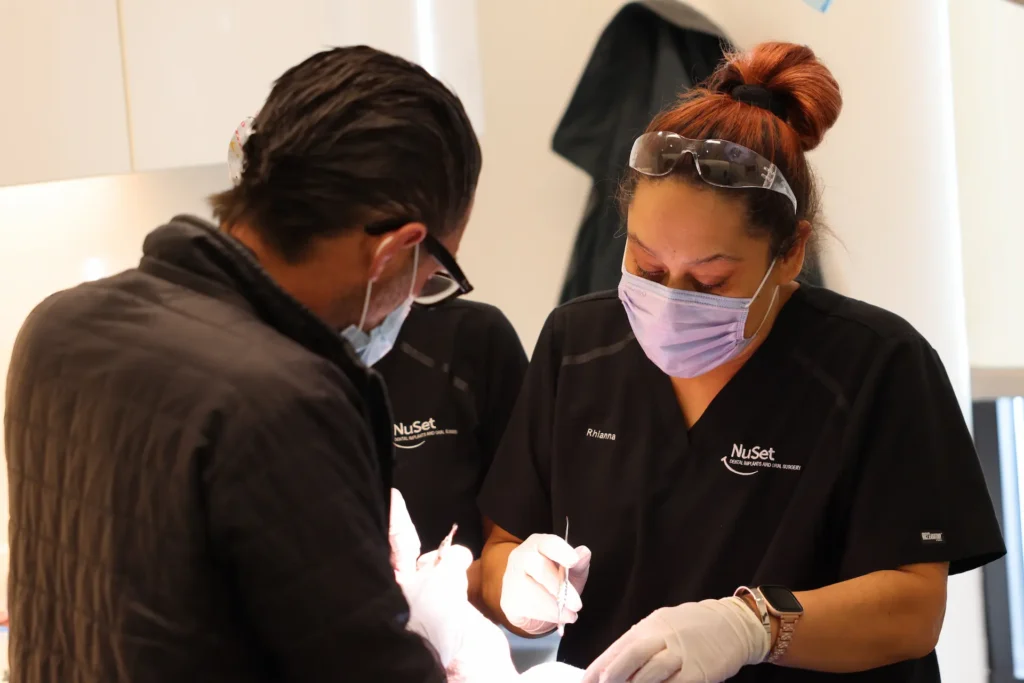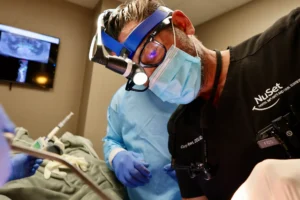Dental implants give you a strong, natural-looking smile. They replace missing teeth and help you chew, speak, and smile with confidence. But just like natural teeth, implants need proper care to stay in good shape. Without good oral health habits and regular check-ups, they can develop problems like plaque buildup, gum inflammation, or even infection. This is no different from natural teeth.
Taking care of your implants is simple. With the right habits, you can keep them clean, protect your gums, and make sure they last for years. Keep reading to learn how to maintain your dental implants. You’ll learn the best ways to clean them, what to avoid, and when to see your dentist.
Key Takeaways
- Maintaining dental implants is easy and begins with good daily oral health habits.
- Use a water flosser to clean around your implants, rinse with alcohol-free mouthwash to fight bacteria and brush twice a day with a soft-bristled toothbrush and non-abrasive toothpaste.
- Eat a balanced diet to support gum and bone health.
- Visit your dental implant specialist regularly for check-ups and professional cleanings.
- With the right care and good oral hygiene, implants can last a lifetime.
How to Maintain Dental Implants
A few simple habits can keep your smile looking its best. Here’s what you need to do.
Prioritize Daily Oral Care
Taking care of your dental implants every day keeps them clean and healthy. Brush twice a day using a soft-bristled toothbrush. Hard bristles can scratch the implant surface and irritate your gums. Use a non-abrasive toothpaste to avoid damaging the crown.
Flossing is just as important. Use a water flosser (or a waterpik) to clean between your teeth. Water flossers are gentle and great for reaching areas that your toothbrush might miss.
Rinse your mouth with an antibacterial, alcohol-free mouthwash. This helps kill bacteria without drying out your mouth. A dry mouth can lead to bad breath and gum issues.
Make these habits part of your routine. It takes only a few minutes, but it makes a huge difference in keeping your implants strong.
Visit Your Dentist for Regular Check-Ups
Even if your implants feel fine, don’t skip your dental visits. During a check-up, your dental specialist will remove plaque, check your gum health, and make sure your implant is secure. Small problems can turn into big issues if they aren’t caught early. Regular visits help you avoid pain, infections, and expensive repairs.
Avoid Smoking
Smoking slows healing, weakens your gums, and increases your risk of infection. In fact, statistics show that smokers have a 140.2% higher risk of implant failure than nonsmokers.
If you smoke, quitting is the best thing you can do for your oral health. If quitting completely feels too challenging, try cutting back and talk to your dentist about ways to protect your implants. Your gums and implants will thank you.
Limit Alcohol Intake
Alcohol can dry out your mouth and irritate your gums. Over time, this makes it easier for bacteria to grow around your implants. It can also slow down healing if your implants are new.
Drinking in moderation is fine, but try not to overdo it. Rinse your mouth with water after drinking alcohol to help wash away sugars and acids that can harm your gums.
Avoid Chewing on Hard Objects
While implants are strong and durable, biting down on ice, hard candy, or even fingernails can potentially damage them or wear them down over time. Biting down on hard objects not meant for teeth can cause cracks in the restoration or potentially loosen the implant.
If you have a habit of chewing on things when you’re nervous, try finding alternative things to help manage the nerves. If you grind your teeth at night, ask your dentist about a nightguard. A small change can protect your implants from serious damage.
Eat a Well-Balanced Diet
What you eat affects your implants and your overall oral health. Your gums need vitamins and minerals to stay strong. Calcium, vitamin D, and protein help keep your jawbone healthy and prevent bone loss.
Eat plenty of leafy greens, dairy, lean meats, and nuts. These foods help support your implants and your natural teeth.
Avoid Acidic and Sugary Foods
Sugary and acidic foods can cause plaque buildup and gum inflammation.
You don’t have to cut out these foods completely, but eat them in moderation. When you do have something sugary or acidic, rinse your mouth with water afterward.
What Are the Suitable Oral Hygiene Products for Dental Implants?
Not all oral care products are implant-safe, so choosing the right ones can prevent damage and keep your smile in top shape. Here’s what you should use.
Toothpaste
Pick a non-abrasive toothpaste. Some whitening and charcoal-based toothpastes are too harsh and can scratch the implant surface.
Mouthwash
An alcohol-free mouthwash is the best choice. Alcohol can dry out your mouth, making it easier for bacteria to grow. Choose an antibacterial rinse to help fight plaque and keep your gums healthy. A fresh, clean mouth starts with the right rinse.
Toothbrush
Use a soft-bristled toothbrush. Hard bristles can wear down the crown and irritate your gums. Both manual and electric toothbrushes work well, but some electric brushes have implant-safe heads for a gentler clean. If you’re unsure, ask your specialist which one is best for you.
Interdental Brushes
Interdental brushes clean the spaces between your teeth and implants. They help remove plaque in places a regular toothbrush can’t reach. Look for brushes with a soft, flexible tip to avoid scratching the implant. These tiny tools can make a big difference in your daily routine.
Water Flossers
A water flosser is a game changer. It uses a gentle stream of water to remove food and plaque from around your implants.
Bonus Tip: Replace your toothbrush or brush heads every three months to keep it working effectively. A worn-out brush won’t clean as well and can even spread bacteria.
How to Maintain and Care for Full-Arch Implants

Like natural teeth or a single implant, full-arch implants need good oral hygiene habits to stay clean and problem-free.
Brush your implants twice a day with a soft-bristled toothbrush, focusing on the gum line and the area where the implant meets the restoration. Use a non-abrasive toothpaste to avoid scratching the surface. Brushing gently but thoroughly keeps your implants looking and feeling fresh.
A water flosser is a great tool for rinsing out hidden debris. An interdental brush also helps to clean the spaces your toothbrush can’t reach. A few extra seconds of cleaning can prevent serious gum issues.
Rinsing with an antibacterial, alcohol-free mouthwash helps control bacteria and freshens your breath. Swish for about 30 seconds after meals to remove leftover food particles and reduce plaque buildup.
Staying hydrated is also important. A dry mouth can lead to bacteria buildup, increasing the risk of gum disease. Drink plenty of water throughout the day to keep your mouth clean and your gums healthy. If you take medications that cause dry mouth, ask your dentist for solutions.
With the right care, full-arch implants can last for a lifetime. A few small habits can make a big difference in keeping your smile strong and healthy.
Protect Your Dental Implants and Keep Your Smile Healthy – Book a Visit with NuSet Dental Implants and Oral Surgery!
Caring for your dental implants is simple. Daily brushing, flossing with a waterpik, and using the right oral care products will keep them clean and strong. Regular dental check-ups are just as important. Even if your implants feel fine, routine visits allow your specialist to catch problems early and keep your implants in top condition.
Your smile is worth protecting.
Frequently Asked Questions
Do teeth implants need maintenance?
Yes, dental implants need regular care, just like natural teeth. Daily brushing, flossing with a waterpik, and routine dental check-ups help prevent plaque buildup and gum disease. Using implant-friendly oral care products also keeps them in good condition.
How do I take care of my dental implants?
Brush twice a day with a soft-bristled toothbrush and non-abrasive toothpaste. Floss daily using a water flosser. Rinse with an alcohol-free mouthwash to keep bacteria under control. Avoid smoking, limit alcohol, and visit your dentist regularly for professional cleanings and check-ups.
What is the lifespan of dental implants?
With proper care, dental implants can last a lifetime. The titanium or zirconia post that fuses with your jawbone is designed to last a lifetime with proper care. However, the crown (the visible part of the implant) may need replacement due to normal wear and tear.
How can I protect my implants?
Avoid chewing on hard foods, ice, or non-food items like a pen for example, as they can damage your implants. If you grind your teeth, use a night guard to protect them. Stay hydrated, eat a balanced diet, and follow a good oral hygiene routine. Regular dental visits are also key to keeping your implants in top shape.





